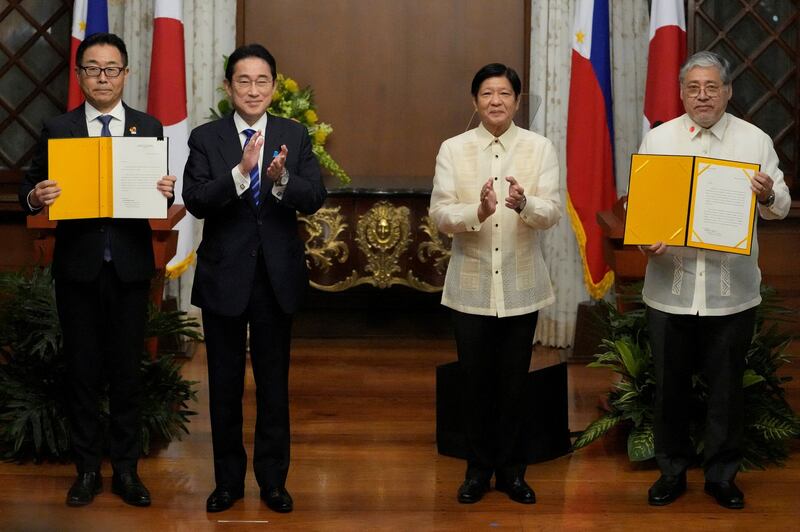The leaders of Japan and the Philippines signed a military aid package on Friday and pledged to begin negotiations on a defense pact as both countries encounter rising tensions with China.
In addition to providing military assistance to Manila, visiting Japanese Prime Minister Fumio Kishida promised a slew of development aid packages to the Philippines, bolstering a bilateral relationship that shares common allies and rivals, according to a report by BenarNews, a news outlet affiliated with Radio Free Asia.
“First of all, under the increasingly severe and complex international situation, we are deepening our cooperation in the area of security,” Kishida said at a press conference alongside Philippine President Ferdinand Marcos Jr.
“And a further decision was made to start negotiations of a Reciprocal Access Agreement (RAA) … to further strengthen trilateral cooperation among Japan, United States and the Philippines.”
The RAA is a defense agreement that Japan has pursued with a handful of countries, such as the United Kingdom and Australia, serving as a framework for the country's military and security operations and training with other nations. It could pave the way for troop deployments in joint military drills and other security operations, such as joint patrols.
Before he concludes his two-day visit, Kishida will address a special joint session of Congress on Saturday, becoming the first Japanese leader to do so. During World War II, Imperial Japan occupied the Philippines.
'Like-minded states'
After landing in Manila on Friday, Kishida began his visit by laying a wreath on the tomb of Jose Rizal, the Filipino national hero known for his activism against Spanish colonial rule. The prime minister was then whisked to the presidential palace in Manila, where he held a closed-door meeting with Marcos.
“As leaders of like-minded states, we affirm our commitment to peaceful negotiations to resolve maritime conflicts, and the need for a stable and secure environment, for mutually inclusive growth and development for our peoples,” Marcos said in the news conference organized after their meeting.

The Philippine Department of National Defense will receive a grant of 600 million yen (U.S. $4.02 million) to purchase coastal radars as the first project under Japan’s newly launched Official Security Assistance (OSA) funds, the leaders said.
Japan will also provide aid grants worth U.S. $6 million to purchase trucks, bulldozers, and other heavy equipment to repair transport networks and infrastructure damaged by natural disasters in Bangsamoro, an autonomous region predominantly inhabited by Muslims and marked by conflicts between militants and the Filipino military.
The Filipino president also noted Japan’s financing of the ongoing Metro Manila Subway and the North-South Commuter Railway projects, estimated to cost billions of dollars.
Kishida's visit followed Marcos's trip to Tokyo in February. From Manila, the Japanese leader will travel on to Malaysia on Saturday for an official visit.
Both leaders discussed a wide range of political, security, and economic issues, but the rising tensions surrounding disputed waters in the South China Sea featured prominently in the talks, officials with the Philippine foreign office said.
'Rules-based approach'
In a joint statement, both leaders reaffirmed their support for a “rules-based approach to resolving competing claims in maritime areas” and “their commitment to freedom of navigation and overflight in the East and South China Seas.”
While the Philippines and China are locked in a territorial dispute in the South China Sea, Japan and China have contending territorial claims in the East China Sea.
In 2016, an international arbitration court ruled in favor of the Philippines when it rejected China’s territorial claims to most of the South China Sea on historical grounds.
In recent months, China and the Philippines have engaged in increasingly tense rhetoric as both countries assert their claims over the contested waters amid standoffs at sea between Chinese and Filipino coast guards and other vessels.
As recently as last week, the Chinese military said it had warned off a Philippine warship that it accused of “trespassing” into the waters around the Scarborough Shoal, while Filipino National Security Adviser Eduardo M. Año called it “routine patrol operations.”
BenarNews is an online news outlet affiliated with Radio Free Asia. Jeoffrey Maitem contributed reporting from Davao City, southern Philippines.
